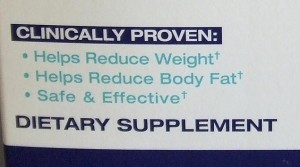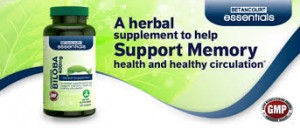The Attorney Generals of 14 states have “asked Congress to launch an investigation of the herbal supplements industry and to consider giving the US Food and Drug Administration stronger oversight of the industry,” according to New York Attorney General Schneiderman.
Labels of supplements sold in the United States have not only been found to not contain the ingredients listed, but often lie about the health effects of the product they sell. Supplement makers are allowed to make vague claims such as “boosts the immune function,” or “supports memory,” or “maximum sexual power.” All of this in spite of no evidence showing that these are true.

None of these claims are true. And “clinically proven” can be as little as someone saying it worked for them.
Supplements are not regulated by the FDA, and have had lax regulation since congress enacted a law specifically to protect them against FDA regulations. It was NY state attorney’s office that checked DNA samples from supplements purchased at GNC as well as Target, Walmart, and Walgreens finding that often supplements did not contain the ingredient they claimed. For a full report about that see the blog Fraudulent Supplements Targeted by New York Attorney General.
New York Attorney General Eric Schneiderman noted research that has found some herbal supplements to contain high levels of heavy metals like lead, mercury, and arsenic, and a study that found a popular herbal supplement designed to reduce menopause symptoms may have caused severe liver damage in certain women.
“The FDA has long been aware of problems in the dietary and herbal supplement supply chain, from dubious ingredient sourcing to a failure to carry out proper testing on finished products,” the attorneys generals of 14 states said in a letter sent Thursday to Kansas Sen. Jerry Moran and Pennsylvania Rep. Joe Pitts, chairmen of the subcommittees dealing with product safety and health.
In addition to the NY Attorney General the letter is co-signed by the attorneys general of Connecticut, District of Columbia, Hawaii, Idaho, Indiana, Iowa, Kentucky, Massachusetts, Mississippi, New Hampshire, Northern Mariana Islands, Pennsylvania, and Rhode Island.
General Nutrition Center (GNC) recently announced they will begin testing of nutritional supplements in the wake of the NY Attorney General finding that supplements sold in its store did not contain the ingredients on the label. While this is a first step, it is not enough- as there is vast fraud in the claims made by the supplement industry.
The NY Attorney criticized the lax federal standards that contributed to the environment where consumers could not be guaranteed the quality of the supplement they were purchasing. Many of the supplements did not contain the DNA of the plant they claimed to have. The 1994 federal law states that supplements must carry the names and amounts of every ingredient they contain, but are held to an honor code, and not tested. In some cases supplements labeled gluten free contained wheat products (which have gluten). The FDA was tied by Congress, and has no way to regulate this unless a problem is brought to their attention.
Supplement makers claimed that the bottles contained extracts of the herbs, and therefore would not have the DNA, although they have not provided proof of their claim, nor allowed inspection of facilities or tests of purity. Supplement manufacturers are not required to place doses of the supplements. For example: if Gingko Biloba is listed, they may or may not list the dose. Gingko Biloba has been tested, in a double-blinded test of over 3000 adults over the age of seventy it was found: Compared with placebo, the use of G biloba, 120 mg twice daily, did not result in less cognitive decline in older adults with normal cognition or with mild cognitive impairment.
In spite of that finding, supplements such as those containing Gingko Biloba are allowed to make claims such as “support memory,” when in fact the data shows otherwise. But making a broad claim is allowed, and the manufacturer can provide poor studies that might show some improvement.

The claim to “support memory” is unfounded, and yet it is allowed to label this as such.
This lack of regulation has been noted by the Department of Health and Human Services Office of Inspector General report, “DSHEA (Dietary Supplement Health and Education Act) does not require manufacturers to submit dietary supplements to FDA for safety or approval prior to sale. As a result, FDA has no comprehensive list of dietary supplements on the market. Dietary supplement manufacturers must ensure that their products are safe, they have evidence to substantiate structure/function claims, and that product lables are truthful and not misleading.”
Vitamins: We Don’t Make Them Here
The vast majority of vitamins are now manufactured in China (A, B12, and E along with 75% of D, and 80% of vitamin C), some in Europe, with no major vitamin manufacturing in the United States, and no oversight in terms of quality of those products. This means there is no quality assurance of the majority of vitamins brought into the United States.
Supplements from Asia have also been found to contain banned substances, such as Meridia, a prescription weight loss product that was found to have a higher incidence of stroke and heart disease and taken off the shelves. For more about that read Tainted Weight Loss Supplements: FDA Warning .
No information has been passed to the FDA regarding human studies for many supplements. “One company submitted a 30-year old handwritten college term paper..while others included articles from trade newsletters; press releases; advertisements; and links to web pages, such as Wikipedia or an online dictionary.”
While GNC’s testing is a start, it is far from the types of labeling that consumers would prefer to have with food and supplements. Until we have appropriate labeling, with verified safety studies and close the loopholes to making broad claims the 33 billion dollar supplement industry has free reign to poison America.
Reference:
Snitz BE, O’Meara ES, Carlson MC, et al. Ginkgo biloba for Preventing Cognitive Decline in Older Adults: A Randomized Trial. JAMA. 2009;302(24):2663-2670. doi:10.1001/jama.2009.1913.
A paper about Oil of Oregano https://www.sciencebasedmedicine.org/oil-of-oregano/
